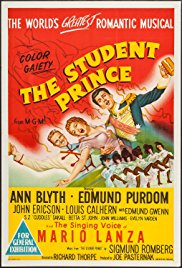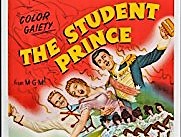The Student Prince ** (1954, Ann Blyth, Edmund Purdom, John Ericson, John Williams, Edmund Gwenn, S Z Sakall, Louis Calhern) – Classic Movie Review 6886
Sigmund Romberg’s classic operetta The Student Prince is stodgily filmed by MGM in 1954, but nothing stops those vintage Romberg melodies. Mario Lanza’s beautiful tenor voice soars on the soundtrack, but he is nowhere to be seen in the film. A sad story, when two egos collide.
Sigmund Romberg’s classic operetta The Student Prince is stodgily filmed by director Richard Thorpe in 1954 for MGM, but nothing stops those vintage Romberg melodies like ‘Deep in My Heart, Dear’, ‘Golden Days’, ‘The Drinking Song’ ‘To the Inn We’re Marching’ and ‘Serenade’ lingering on. Mario Lanza’s beautiful tenor voice soars on the soundtrack, but he is nowhere to be seen in the film. And further disappointingly, 14 of the operetta’s songs are eliminated, while new lyrics by Paul Francis Webster largely replace the original lyrics by Dorothy Donnelly. The film makes too many changes from the operetta.
And there are three new songs. Mario Lanza also memorably sings ‘Beloved’, ‘Summertime in Heidelberg’ and ‘I’ll Walk with God’ (music by Nicholas Brodszky, lyrics by Paul Francis Webster). Less memorably, though more amusingly, Ann Blyth and the Men’s Chorus sing Romberg’s ‘Come Boys, Let’s All Be Gay Boys’. MGM also advertise ‘Color gaiety’.
The film credits ‘the singing voice of Mario Lanza’. Alas Mario Lanza’s alleged ballooning figure and difficult temperament confined him to singing on the soundtrack (how humiliating that must have been!), so on screen Prince Karl, the Old Heidelberg prince, is played by the slim English actor Edmund Purdom. Kathie Ruder, the beautiful barmaid he romances, is impersonated by sweet Ann Blyth, and both she and Lanza are in fine voice, though the lip-synching Purdom never really looks as though he is singing Lanza’s vocals.
Other assets are the vintage cast of John Williams as Lutz, Louis Calhern as King Ferdinand of Karlsberg, Edmund Gwenn as the tutor Professor Juttner, John Ericson as Count Von Asterburg, and S Z Sakall as Kathie’s innkeeper father, Joseph Ruder.
Also in the cast are Evelyn Varden as Queen Mathilda, Betta St John as Princess Johanna, John Hoyt as Prime Minister Von Mark, Richard Anderson as Lucas, Roger Alan, Steve Rowland, Chris Warfield, Gilbert Legay, Archer MacDonald, Charles Davis and John Qualen.
The Student Prince is directed by Richard Thorpe, runs 106 minutes, is made by MGM, is written by William Ludwig and Sonya Levien, based on the play Alt Heidelberg by Wilhelm Meyer-Förster, and the book by Dorothy Donnelly, is shot in Cinemascope widescreen and Anscocolor by Paul C Vogel, is produced by Joe Pasternak, is scored by George E Stoll, with music by Sigmund Romberg and is designed by Cedric Gibbons, with choreography by Hermes Pan.
It was previously filmed as the silent classic Old Heidelberg (The Student Prince in Old Heidelberg) by Ernst Lubitsch in 1927, with Ramon Novarro and Norma Shearer.
Producer Joe Pasternak vainly tried to persuade Deanna Durbin out of retirement to play Kathie.
Purdom is singing along with Lanza’s pre-recorded vocals after he spent three months practising with the recordings.
Richard Thorpe replaced original director Curtis Bernhardt.
Lanza had been cast as Prince Karl, but after recording the soundtrack he walked off the picture before principal photography, and started a protracted battle with studio head Dore Schary arising from artistic differences with the original director Curtis Bernhardt, and was eventually fired in 1952 by MGM. The tabloid press alleged Lanza’s recurring weight problem had made it impossible for him to fit into the costumes of the Prince. But this was not true. Lanza was not overweight at the beginning of the production, and it was the disagreement with Curtis Bernhardt over Lanza’s singing of one of the songs in the film that led to Lanza walking off the set, vowing not to return as long as Bernhardt was the director, with MGM refusing to replace Bernhardt.
Ironically, the film was then subsequently made by director Richard Thorpe, with Edmund Purdom dubbed to Lanza’s recorded singing voice. Under the terms of MGM’s settlement with Lanza, they retained the rights to use the songs for the film’s soundtrack that Lanza had recorded. The songs, including ‘Beloved’ – written specially for the film – and ‘Serenade’ from the original show, are some of those most identified with Lanza, even though they were mouthed in the film by Edmund Purdom.
After all that, the film was a hit. It earned $2,528,000 in North America and $2,813,000 in other countries, making MGM a profit of $451,000.
Depressed by his dismissal and in financial trouble, and with his usual considerable self-confidence undermined, Lanza became a virtual recluse for more than a year, having alcoholic binges. But Lanza returned to an active film career in 1955 in Serenade, released by Warner Bros.
Born Alfredo Arnold Cocozza in Philadelphia on 31 January 1921,Mario Lanza died of an apparent pulmonary embolism at the age of 38 on 7 October 1959.
Ann Blyth played opposite Lanza in the 1951 blockbuster The Great Caruso, also directed by Richard Thorpe, who had worked harmoniously with Lanza.
RIP Richard Anderson, who died on 31 aged 91.
© Derek Winnert 2018 Classic Movie Review 6886
Check out more reviews on http://derekwinnert.com



